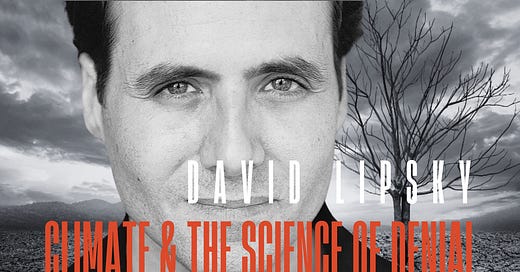I had the pleasure of sitting down with the ever-entertaining New York Times bestselling author David Lipsky via Zoom at the Pig and Tail Pub in Birmingham. Before diving into the heavy topic of climate change, David and I found common ground in discussing Jamaican music and Birmingham’s significant contribution to British music history. With the chronology of Jamaican music established and Birmingham's cultural supremacy over Manchester affirmed, I hit the record button, and what followed was a fascinating and insightful conversation.
David’s latest book, "The Parrot and the Igloo: Climate and the Science of Denial," explores the history of climate change denial in America. David is a supreme storyteller; he weaves seemingly unrelated themes together—they almost feel like discordant jazz notes at times—but they serve to hold a mirror to the history of invention and enquiry. Whether discussing John Tyndall’s discoveries or Nikola Tesla and Edison’s ambitions, the book consciously explains the history of scientific progress. It's a substantial work, spanning over 400 pages. Despite its size, it's a fun read—a sentiment echoed by many reviews. They all agree that it's a rip-roaring read that’s both informative and enjoyable.
We began by discussing the roots of climate change denial and its implications in culture and in our psychology as a species. “A sufficiently advanced technology will always seem like magic,” is the famous Arthur C. Clarke quote, illustrating the initial marvel at technological progress. David connected this to how early warnings about climate change were overshadowed by the excitement over industrial advancements. I remarked that the combustion engine was once seen as a solution to urban pollution caused by horse-drawn carriages and is a prime example of this paradox.
David talked into the political and cultural aspects of climate denial, something I noted was particularly American. “The phrase 'climate change' was designed to make people less anxious about it,” he explained, highlighting how language has been used to downplay the severity of the issue. This strategic rebranding was meant to make the problem seem more manageable, diverting attention from the urgent need for action.
One of the most striking parts of our conversation was David’s perspective on individual versus systemic responsibility. He remarked, “The most honest answer to why you drive or fly is: we didn't make that deal. We accepted the world as it was presented.” This statement resonated deeply, underscoring the unfair burden placed on individuals to solve a problem created by larger systemic forces.
David also shed light on the historical context of climate change awareness. “We had known most of the stuff that we know since the 50s. And we had especially known it in the 70s and it had gone to the presidential level.” This revelation was shocking, considering the persistent denial and inaction despite decades of scientific evidence.
As the hour mark of our chat approached, David touched on the broader implications of climate denial and the role of technology. “We need to change our laws, not our light bulbs,” he quoted Al Gore, emphasising the need for systemic change over individual consumer choices. This call to action is crucial in governments almost passing the buck from organisations to the populace. Big business and governments need to do their share, but the power of lobbies and immediate profits mean that we are made to feel guilty when not sorting out glass and paper recycling, while big companies continue to make huge profits whilst polluting our environment and warming the atmosphere.
Our conversation at the Pig and Tail Pub was more than just an interview; it was an eye-opening exploration of how history, culture, and politics intertwine in the ongoing conversation on climate change denial. David doesn't claim to offer technical solutions to the climate crisis but insights into our attitudes towards it. In this regard, his book is a worthy exploration into our cultural and political inertia in the face of environmental cataclysm.















Share this post